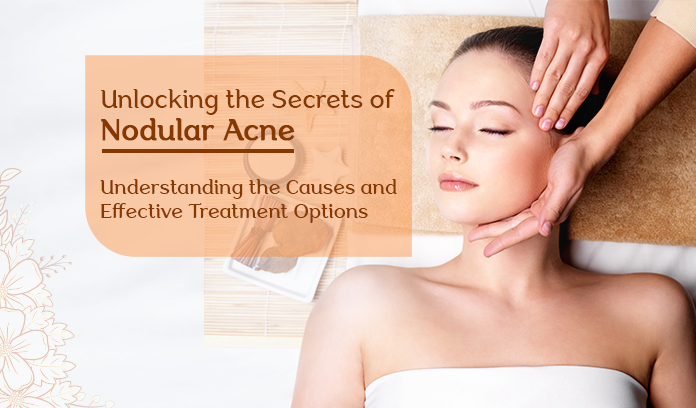Deciphering Hormonal Factors in Nodular Acne: Understanding Causes & Treatment
Explore the intricate connection between hormonal imbalance and nodular acne formation. Learn about triggers, treatment options, and hormonal fluctuations. Consult a medical professional for personalized advice.
Unveiling Hormonal Factors in Nodular Acne: Causes & Solutions
Hormonal imbalance plays a significant role in the development of nodular acne, a severe form of acne characterized by deep, painful lesions beneath the skin’s surface. Understanding the intricate interplay between hormones and acne formation is crucial for effective management and treatment.
Understanding Hormonal Imbalance
The Role of Androgens
Androgens, including testosterone, play a key role in stimulating sebum production in the skin’s oil glands. Excessive sebum production can clog pores and contribute to the formation of nodular acne lesions.
Sebum Production and Nodular Acne Formation
Increased sebum production, combined with the shedding of skin cells, creates an ideal environment for the development of nodular acne. The accumulation of oil and dead skin cells within hair follicles leads to inflammation and the formation of deep, painful nodules.
Exploring Hormonal Fluctuations
Hormonal Acne Triggers
Hormonal fluctuations, such as those experienced during puberty, menstruation, pregnancy, and menopause, can trigger or exacerbate nodular acne. Fluctuating hormone levels influence sebum production and skin cell turnover, contributing to acne development.
Testosterone, Estrogen, and Progesterone Levels
Changes in testosterone, estrogen, and progesterone levels can impact sebum production and skin health. Elevated testosterone levels, commonly seen in puberty and hormonal disorders like polycystic ovary syndrome (PCOS), can increase the risk of nodular acne.
Understanding Hormonal Contraceptives
Managing Hormonal Changes
Hormonal contraceptives, such as birth control pills, can help regulate hormone levels and reduce acne severity in some individuals. However, not all hormonal contraceptives are suitable for acne treatment, and consultation with a healthcare professional is recommended.
Addressing Puberty and Acne
Hormonal Changes During Adolescence
Puberty is a common time for hormonal fluctuations, often leading to an increase in acne breakouts, including nodular acne. Proper skincare, along with medical intervention if necessary, can help manage acne during this transitional period.
Exploring Menstrual Cycle and Acne
Hormonal Changes Throughout the Menstrual Cycle
Many women experience acne flare-ups before or during menstruation due to hormonal fluctuations. Understanding the menstrual cycle and its impact on acne can help individuals implement preventive measures and treatment strategies.
Understanding Polycystic Ovary Syndrome (PCOS)
Hormonal Imbalance and Acne
PCOS is a hormonal disorder characterized by elevated androgen levels, insulin resistance, and irregular menstrual cycles. Women with PCOS often experience severe acne, including nodular acne, as a result of hormonal imbalances.
Managing Hormonal Changes During Pregnancy
Pregnancy and Acne Flare-Ups
Hormonal changes during pregnancy can affect skin health, leading to acne flare-ups in some women. While certain acne treatments may be contraindicated during pregnancy, consulting a healthcare provider is essential for safe management.
Exploring Hormonal Acne Treatment
Tailored Treatment Approaches
Treatment for hormonal acne, including nodular acne, may involve a combination of topical medications, oral medications, and lifestyle modifications. Targeting the underlying hormonal imbalance is key to effectively managing acne and preventing future breakouts.
In conclusion
Understanding the complex relationship between hormonal imbalance and nodular acne formation is essential for effective treatment and management. Consulting a medical professional allows individuals to develop personalized treatment plans tailored to their unique hormonal profile and skin concerns. Embracing a holistic approach to skincare, including proper hygiene, diet, and stress management, can help address hormonal acne and promote clearer, healthier skin. Consultation with a medical professional before embarking on any new skincare regimen or treatment plan is strongly advised.











